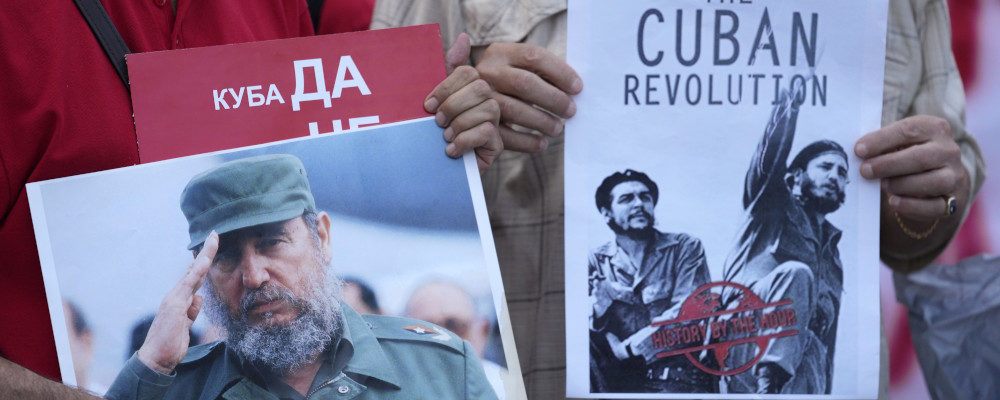Any Canadian who has visited Cuba and took the time to go beyond one of those insulated packaged beach resorts — subsidized by cheap Cuban labour — and is honest with themselves must conclude the country is an island prison inhabited with tortured souls begging to get out.
Cities like Havana are ghost towns with people.
And tightly controlled ghost towns at that. Cuba has more secret police per capita than the Stasi had in East Germany.
That’s why it seemed a miracle that thousands protested across the country recently crying out for food and freedom and suffering the highest per-capita outbreaks of COVID-19 in Central America.
And yet, many Canadians continue to romanticize the country for the simple pleasure of seeing Cuba stick it to the Americans. They don’t know the madness of the man who was willing to sacrifice every Cuban life and the outbreak of a nuclear war.
During the Cuban Missile Crisis in 1962, after the Soviet Union placed ICBMs, bomber planes and transferred thousands of Soviet troops to the island, the world waited in fear for 13 anxious days. U.S. President John F. Kennedy and Soviet leader Nikita Khrushchev finally agreed to disarm and pull their nuclear weapons from Cuba and Turkey.
When the agreement leaked out to the Cuban government, a furious Fidel sent a letter to Khrushchev demanding the immediate launching of a nuclear strike on the U.S., saying the Cuban people are “…willing to sacrifice themselves for the destruction of imperialism and the victory of world revolution.” Not that Castro asked the Cuban people whether they were willing to go along with this madness.
At that point, Khrushchev knew Castro was mentally unstable. This is the man our prime minister, who mourned his death in 2016, said, “While a controversial figure, both Mr. Castro’s supporters and detractors recognized his tremendous dedication and love for the Cuban people who had a deep and lasting affection for ‘el Comandante’.”
Cuba, 1958
Castro sympathizers live under the illusion that Fidel saved Cuba from an oppressive regime under President Fulgencio Batista, American capitalism and the mafia — right out of scenes from Godfather 2. As I have written before, and apologies to philosopher George Santayana, those who cannot remember the past aren’t condemned to repeat it but are condemned to having Hollywood teach it to them.
Cuba was not the basket case many Canadians believe before the Castro brothers and their pal Che Guevara took over. For a country supposedly suffering under Batista, Cuba’s economy continued to grow throughout the 1950s, with rising industrial and agricultural wages comparable to those in Europe. Workers were entitled to a one-month paid holiday and an eight-hour work day, while mothers were given six-week leave before and after childbirth. Before the revolution, the island nation had a rich literary and cultural life with 58 different daily newspapers and a capital city with more movie theatres than New York City. In the end, Batista did one thing the Castro’s never did: he won an election before taking power.
The Cuban government and Cuba defenders, such as U.S. Senator Bernie Sanders, have always banged on about Cuba’s high literacy rates under Castro. An exaggerated claim. Literacy rates were rising from 1900 and were at 80 percent before 1959. Castro never allowed an independent confirmation of his literacy progress.
One has to ask what it means to have an educated population when most of what people read is filtered through Marxist ideology. Today Cuba has 30 universities and institutes but limited access to modern textbooks, the internet, email, international media and academic journals.
Pre-revolution Cuba enjoyed Latin America’s highest per-capita consumption of meats, fruits and vegetables, along with higher ownerships of cars, telephones and radios. Today, waiters with graduate degrees take home leftover food scraps from the tourists they serve. When the Soviet Union collapsed in 1989, the poorest of the poor were reduced to eating stray cats and dogs. Today’s standard of living ranks with Albania and Sri Lanka.
When it comes to health care, it’s a country where you don’t want to be sick. It’s common for tourists to drop off bottles of Tylenol, bandages and other over-the-country medical supplies to local clinics and hospitals. And if you have the misfortune to end up in one, be prepared to bring your own bedding, towels and soap.
Keep in mind that Cuba had a reputation for a high level of health care and education before Castro. The medical school at the University of Havana has always attracted the best students for Central and South America. As I have noted in a previous article for the National Post, by the late ’50s, the country had more doctors per capita than the U.K. and the lowest infant-mortality rate in Latin America. Today, hard currency is earned by sending doctors abroad while their families are held back to discourage defections. But the best doctors find ways to leave Cuba, where even surgeons earn only $40 a month. Those who can’t end up driving taxis to make ends meet.
What about the embargo? For starters, it’s not an embargo. The last time U.S. embargoed Cuba was during the missile crisis. The U.S. forbids American firms from doing business with Cuba, but any country can do business with Cuba and many do such as China, Italy, Spain and Canada. The Cuban government could have avoided the wrath of the U.S. government if it had negotiated a deal to compensate U.S. firms after the revolution. Castro refused and the country suffered the consequences.
Beginning of the end?
Prime Minister Justin Trudeau eventually came out making a tepid statement about Cubans deserving freedom, respect and democracy while calling for both sides to come together “in peaceful and inclusive dialogue.” That PC word “dialogue” adds a nice sense of absurdity. Even Joe Biden flatly said that Cuba is a failed state and the communism was the cause and that socialism isn’t much better.
Is this the beginning of the end for communism in Cuba, or the end of the beginning, as Winston Churchill once said during the Second World War?
For the sake of the Cuban people, let’s hope it’s the former.




